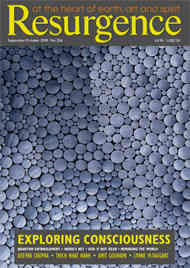Ian Prattis, a former professor of Anthropology and Religion at Carleton University, Canada, belongs to a growing school of thought that believes humanity requires a real shift in consciousness to handle the global crises – environmental, political and economic. He also joins the growing list of authorities who predict how much time we truly have before major catastrophes hit the Earth.
Prattis estimates that we have ten years left. Obviously, there is much conjecture about how much time we have before our species finds itself in a state of irresolvable catastrophe. There is certainly no evidence to determine the date for such forthcoming calamities but perhaps the making of a time-span helps focus our minds on the need for inner change and clear, decisive action.
A core tenet of this book, and one that resonates in the offices of thoughtful academics, global analysts and holistic scientists, is the simple maxim that our thinking has to change if the current worldview is to change. There is little sign of this taking place in the corridors of power, whether the White House, Wall Street, Downing Street or the London Stock Exchange. For example, those who helped create the current economic global crisis are the same people Western governments appointed to resolve it.
Under the guidance of the teachings of much-venerated Buddhist monk-teacher Thich Nhat Hanh, Prattis states that the three poisons of the mind (to quote the Buddha) have become institutionalised: Greed pervades the corporate world. Hate pervades the military. Delusion pervades advertising. The poisoning of land, water and air, and the catastrophes for the world’s poor and marginalised have their origins in the state of mind of those who run our institutions and their intentions to make profit, act violently upon people and the Earth and manipulate the public mind. There are signs of soul-searching going on in our major institutions but the pace is painfully slow.
Sai Baba, a controversial Indian guru, told Prattis that only 2% of the global population needs to meditate on a daily basis to transform human consciousness. Prattis endorses such a view and encourages people to slow down their relentless “doing” in order to experience a sense of “being”: a slowing down of thought, making it possible for fresh ways of thinking to emerge.
The book serves as a valuable collection of reflections on global issues and the part each one of us can plan in making the necessary changes. While drawing on the wisdom of various authorities, past and present, Failsafe reminds us of the Buddha’s recipe for global ills – namely mindfulness, letting go, reflection, inner change, watching desire, inter-connection, and the transformation of consciousness.
Prattis writes that he remains “confident and optimistic about making the world a better place environmentally”. Indeed, there is no point in casting the dark shadow of pessimism or despair over our perceptions of the future. Despair is often the outcome of disappointments of our hopes and expectations. But we do need to acknowledge that we are creatures on this Earth, part of the cosmic web of life, and that what we do to the environment, we ultimately do to ourselves.
There is a deep sense for many of us who grapple with the fragile condition of life on Earth that something is seriously amiss in our values, actions and relationship to life that needs to be addressed, and we need the wisdom of the elders to point to a sane way of life. To his credit, Prattis has usefully employed his own experiences, the wise voice of others and practical steps of advice to address these concerns.
Failsafe concludes with a list of useful websites that inform and inspire further exploration. It is clearly the intention of the author for a call to change the existing order by arriving at a deeper spiritual understanding of what needs to be done. I am sure he would have two words for his readers and other similar books, articles and documentaries: “Act Now.”








